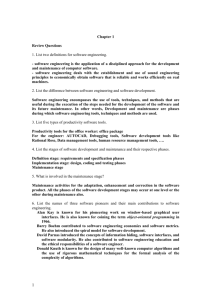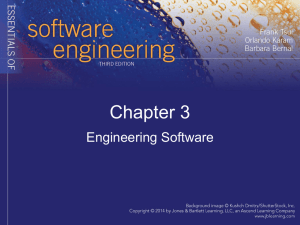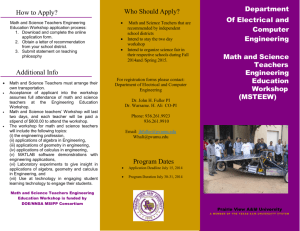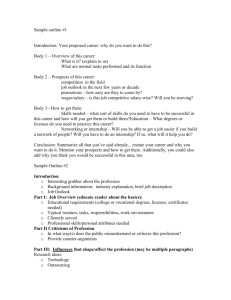uploads/2/5/1/9/25199761 - Jason Wang
advertisement
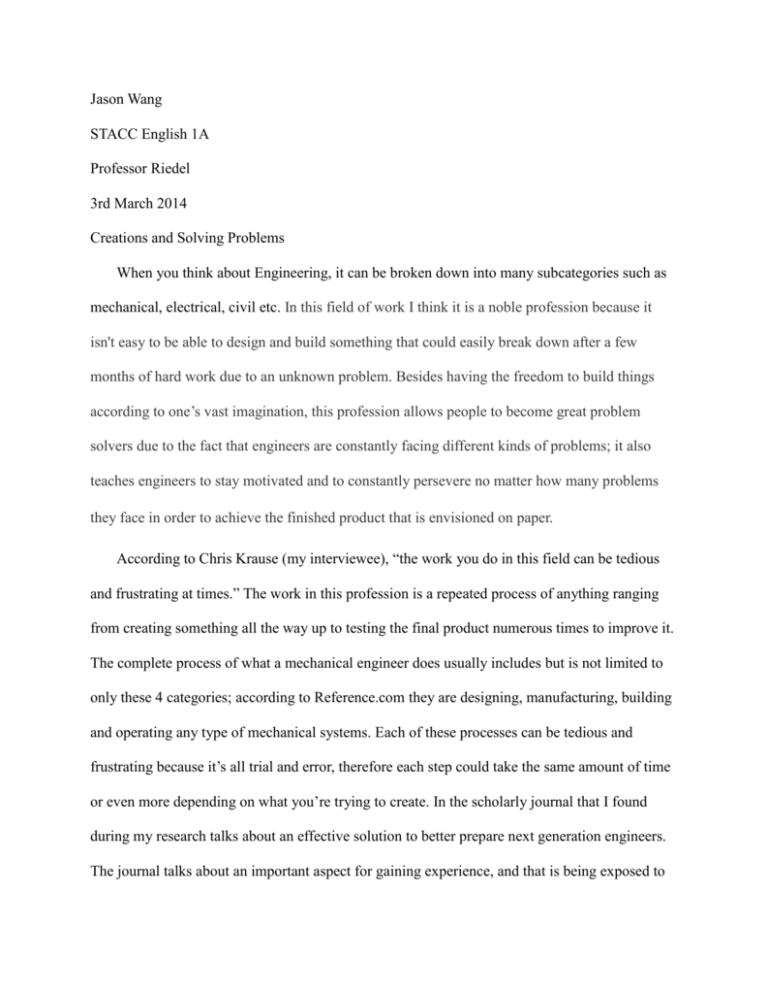
Jason Wang STACC English 1A Professor Riedel 3rd March 2014 Creations and Solving Problems When you think about Engineering, it can be broken down into many subcategories such as mechanical, electrical, civil etc. In this field of work I think it is a noble profession because it isn't easy to be able to design and build something that could easily break down after a few months of hard work due to an unknown problem. Besides having the freedom to build things according to one’s vast imagination, this profession allows people to become great problem solvers due to the fact that engineers are constantly facing different kinds of problems; it also teaches engineers to stay motivated and to constantly persevere no matter how many problems they face in order to achieve the finished product that is envisioned on paper. According to Chris Krause (my interviewee), “the work you do in this field can be tedious and frustrating at times.” The work in this profession is a repeated process of anything ranging from creating something all the way up to testing the final product numerous times to improve it. The complete process of what a mechanical engineer does usually includes but is not limited to only these 4 categories; according to Reference.com they are designing, manufacturing, building and operating any type of mechanical systems. Each of these processes can be tedious and frustrating because it’s all trial and error, therefore each step could take the same amount of time or even more depending on what you’re trying to create. In the scholarly journal that I found during my research talks about an effective solution to better prepare next generation engineers. The journal talks about an important aspect for gaining experience, and that is being exposed to “real world industry projects.” I think being exposed to real world industry problems will prepare future students even more because they will have a taste of what kind of problems they will have to solve when they start to work. Chris stated that “Logic and problem solving skills is the key to have able to survive in this field. In order to enter into the field, it’s best to know people that can guide you through all the different aspects of engineering.” Problem solving skills is important because if a product you designed constantly doesn’t work, then you have to figure out why it’s malfunctioning. In this field of work engineers face many different kinds of obstacles that they may or may not know how to overcome. During my research I stumbled across UCLA’s Engineering webpage, where they listed the Mechanical Engineering curriculum which includes all the courses a student must take in order to receive a Bachelor of Science degree. On UCLA’s webpage, I noticed that the focus of academic courses were mostly Physics and Calculus in which this profession is heavily dependent on Mathematics and Science. Both of these classes are the highest levels of education a Mechanical Engineering student must excel at. Math and Science are crucial educational fields because they are used the most. For example a student would use Physics to structure a bridge that will be built in San Marino. After structuring the bridge, the student would then use calculus to calculate the dimensions of the bridge to figure out which lengths work best for how the bridge will be used. Besides these two important academic courses there are a few others classes that could help you. Some additional classes that might enhance one’s future performance in this field would be programming, computer design, and manufacturing. These additional courses that I listed would assist a student when he uses computer programs to design and test a blueprint project he created. Thanks to computers people don’t have to draw their design on detail to have it reviewed. The language used in this field is very professional. To me, speaking professionally means that you know what you’re talking about and you have experience to back up what you’re saying. Because you are required to take physics and calculus classes your knowledge should be above proficient in these subjects. If a student has not taken physics and calculus before, he or she would not understand the math and science behind designing, manufacturing, and building something. According to Chris, he has different communication modes that he uses towards different people in his work environment. For example if he was talking amongst other engineers he would keep it professional, where as if he was conversing with fellow coworkers or shop workers he tends to keep it light and informal. I think the composition studies that I’ll be taking will allow me to become familiar with the vocabulary and terms that get used often. Instead of just learning something and let it slip out the other ear I would have to force myself to memorize it and use it daily so I could communicate with others more easily. Like I mentioned previously about what Chris had said is that it’s important to know somebody in the industry to help guide you. Without this guidance I will have a hard time finding internships. Internships are often competitive and difficult to get because the skills and experience you get throughout the internship is very valuable. I asked Chris what are some important things to look for when searching for internships. He replied that “look for an internship that offers many opportunities to try everything that the company offers. It is so bad to be stuck in one area and do one thing in a large company. You need to get involved and wear multiple hats when trying to gain experience.” In this quote Chris is talking about being able to do many different things instead of only being professional in one area of the spectrum. It’s the same as having to do one thing over and over again, it gets tedious and boring therefore people would rather do multiple things that are different. Besides making things less boring, knowing how to do multiple things in the field of work shows people that you are skilled, useful and smart. Even though finding summer internships to participate in is very important for everybody, I have not yet reached that step of the process I am taking to become a Mechanical Engineer. Currently my next step in this process is to work even harder than ever to be able to transfer out to a university that has a good Mechanical Engineering program. In order for me to transfer out of PCC it requires me to change my work habits and to do well in the general education classes I take to receive a high GPA. In conclusion the journey to succeed in this profession will not be easy due to the fact that it is extremely competitive. There are many things to learn and be good at in order to stand out and excel in this field. The reason that I want to pursue this profession is because that I am a person that likes to try things instead of doing bookwork, but in today’s standards it’s better to be good at a lot of things instead of only one thing. Therefore I think this profession offers a variety of bookwork and hands-on experience that I could apply in other places as well. In the near future I would like to design, build and test out motor vehicles to make them even better in every single way possible. Works Cited Cheng, Wenming, et al. "Effective Project-Oriented Approach for Training Professional Mechanical Engineers in Undergraduate Education." EBSCO. N. pag. EBSCO. Web. 22 Feb. 2014. <http://web.a.ebscohost.com.ezp.pasadena.edu/ehost/detail?sid=ad755ab9-0d8a-4855-9b 32-6fb3df68dcd3%40sessionmgr4002&vid=3&hid=4209&bdata=JnNpdGU9ZWhvc3Qt bGl2ZQ%3d%3d#db=aph&AN=93871337>. Krause, Christopher Chen. E-mail interview. 21 Feb. 2014. "Mechanical Engineering." Reference. N. pag. Print. http://www.reference.com/browse/mechanical+engineering?s=t UCLA Engineering Office of Academic and Student Affairs. N.p., n.d. Web. 20 Feb. 2014. <http://www.seasoasa.ucla.edu/undergraduates/mae-department-curricular-reqs/mechanic al-engineering>.
